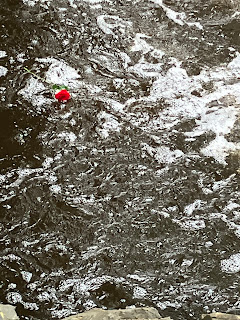It occurs to me after years of teaching philosophy and ethics at university that my so-called actual field of study and interest is philology. This became apparent two years ago when working with some college students who reside in prison to create courses for the university that we called 'turtles all the way down.'
An inmate scholar would create with faculty member (myself) a course which is co-taught to student scholars, After completion of the study for college credit members of the class would then facilitate non-academic groups inviting other inmates to four to eight week conversation groups incorporating the material of the study into the ordinary interests/concerns of the participating population.
The term philology is derived from the Greek φιλολογία (philología),[7] from the terms φίλος (phílos) 'love, affection, loved, beloved, dear, friend' and λόγος (lógos) 'word, articulation, reason', describing a love of learning, of literature, as well as of argument and reasoning, reflecting the range of activities included under the notion of λόγος. The term changed little with the Latin philologia, and later entered the English language in the 16th century, from the Middle French philologie, in the sense of 'love of literature'.
The adjective φιλόλογος (philólogos) meant 'fond of discussion or argument, talkative', in Hellenistic Greek, also implying an excessive ("sophistic") preference of argument over the love of true wisdom, φιλόσοφος (philósophos). (--wikipedia)
It was ambitious. Several of the men were engaged in graduate studies of their own. The structure of the university/prison partnership fell apart for reasons I, as an outsider, could not discern. So we continue, as we have for the last 25+ years, our weekly open conversations at the prison (now also at the Farm) for general population. We call them meetingbrook conversation. Many of the men call it the philosophy group. There's poetry, philosophy, politics, spirituality, theology, meditation mindfulness, personal issues, addiction and recovery, anthropology and archeology, systems thinking, and whatever comes up from week to week.
I realize it is about words. How we contain our experience in worded expression, exploring the meaning of the words we use, configuring experience and emotion as conveyance to others of the deep hidden artifact we call self/mind/soul.
Last evening's Tuesday conversation (introduced by Eli, Doris' grandson) wondered about the twin ideologies of goddess culture and warrior culture as spoken about by Marija Gimbutas. What if the goddess/warrior issue was not a gender/biological difference but, rather, an ideological/consciousness divide that persists to this day? Are we better off as a species when we incorporate, include, and assist one another? Or, when we divide, conquer, and eliminate one another?
If goddess culture means bringing to birth, nurturing and nourishing one another; and warrior culture means overcoming, possessing, and dominating one another -- I'm more interested in the ethos and the philology of the goddess.



